- Home
- Scott Turow
The Last Trial Page 27
The Last Trial Read online
Page 27
Kiril is clearly taken aback by his lawyer’s tone. The two are invariably courtly with one another, but Kiril agrees and says he will drive over. In the meantime, Marta and Pinky join Stern in the Cadillac with Ardent.
As soon as the door closes, Marta hugs her niece with both arms.
“I mean, amazing. Right, Dad? So smart.”
“Genius,” says Stern. “Truly, Pinky, you completely changed the course of this trial.”
Marta asks Pinky how she even thought about the business cell phone.
“So, like, I knew that this morning the prosecutors were going to be putting in the records of Kiril’s phone calls from his office, and I said to Janelle when I was out there last night, ‘God, think how much better off he’d be if he’d called the broker from his business cell phone.’ You know, I’m like everybody else, thinking those records evaporate after a few months. But Janelle knew the detail has to stay online for four years. So it dawned on me, Well, okay, as long as we’re getting all these papers for Innis, let’s get those records, too. It was just a guess,” says Pinky, but she still has her wide smile of uncontained pride.
“I think,” says Stern, “that come what may, Kiril will be paying for your tickets to see the Fire-Breathing Cattle.”
The car rocks with laughter, even from Ardent in the front seat, who does not know exactly what the joke is.
Back at Stern & Stern, the three of them head off separately. Waiting for Kiril, Stern finds Vondra has left a file on his desk, which proves to be the notes of his interview with Olga last March, which indeed was the same day he was run off the road. He studies the single sheet of yellow foolscap, eventually recalling more of his meeting than the neurologist would have told him was possible.
He goes through some conjectures about what Olga took from his questions, then moves to the window, in the mood for reverie. From here on the thirty-eighth floor of Morgan Towers, the river is slate and, as the sun declines, is decorated like a cake with a raspberry gleam. Over time he’s come to comprehend the nuances of the Kindle’s many tones. Stern can tell from the density of color if the barometer is dropping, if the cloud cover is likely to lift. That is the value of experience, he supposes, to be able to read the meaning of signs, to know the large impact signaled by small things.
Although he gave the matter no thought until now, his cross-examination of Innis is, in all likelihood, the last he will ever undertake. In order to let Sandy concentrate on his closing argument and, God save them, Kiril’s testimony, Marta will handle the one or two government witnesses remaining. Cross is the high art of defense lawyering, the essence of what the Constitution means by granting criminal defendants the right to confront the witnesses against them. Stern’s last time at bat will go into the record book as a grand slam; what surer sign of success than forcing a witness to assert her Fifth Amendment right to silence in the midst of her testimony, a first even for him? But what will actually stay with Stern, he knows, is the complete disorientation he felt at first, the ineptitude. He wasn’t even swinging and missing; the bat was staying on his shoulder while he tried to figure out what game they were playing. It is a good time—past time—for him to leave the courtroom. Thank God for Pinky, he thinks. That, too, may be a first.
Vondra phones him: Kiril is on his way back. Stern takes a seat behind his desk, like the school principal. This will not be pleasant. He does not come to his feet when Kiril is shown in. Pafko looks jaunty again today, with a more energetic posture. Across the office, Stern can smell that Kiril used the ride over to douse himself from the bottle of aftershave Stern has seen on occasion in his glove compartment. Until now, Stern did not make much from the fact that Pafko was so often intent on freshening up.
“I know you are in a rush, Kiril, so I will get to the point quickly. We must have a word about Olga.”
“Olga?” Pafko throws his trench coat—a match for Olga’s—over the chair arm and crosses his legs. He is doing his best to appear baffled.
“How is it, Kiril, that Olga knew we were looking for the records related to Innis’s severance agreement? Document production is not in her area at the company, is it?”
“Dear me, Sandy. Are you complaining that she took initiative? I thought you’d be thrilled with her.”
“Kiril, you are not answering my question. How did she know?”
“Sandy, back at the headquarters, there is constant discussion of what is happening in court. The Tribune has an hourly news feed. It is open on most computer screens.”
“But the Tribune does not report about the documents we are looking at. I have told Janelle several times not to discuss that with anyone but the company’s outside counsel. We do not want to give the government grounds to accuse us of influencing witnesses. So how was it that Olga knew what we were looking for?”
Pafko pouches up his mouth but does not answer.
“Kiril, you lied to me about your relationship with Olga.”
Pafko’s last efforts at a cheerful affect fade. “Ah,” he says.
“Ah,” repeats Stern. “You sat where you’re sitting now only a few days ago and lied to my face.”
“Actually, Sandy,” he says. Stern interrupts.
“No more artifice, please, Kiril. We have known each other far too long.”
“You saw us last evening at the U Club?” Pafko asks.
“Just so,” says Stern.
“May I explain?”
“I would rather you think carefully before telling me anything further that proves to be untrue. You know, the denouement of Innis’s testimony was a great triumph for your defense, but Moses will rally after a bit and ask the logical question. Granted, Innis knew about the sudden deaths, and probably long before she left the company. But how? Medical research was not her area. Who told her? Who else, Kiril, but you?”
“Really, Sandy—”
“No.” Stern is holding up a hand. “I prefer you listen. You may lie to me about Innis. And about Olga. But not when doing so exposes me. Which leads me to my last subject. As we have seen, Pinky’s instincts as an investigator are far better than one might think. And right now, she has a theory that you will not share the records from the PT motor pool because you know they will suggest that it was Olga who ran me off the road last March.”
“Olga?” Kiril’s nutshell face cycles through a variety of expressions, but none of them strike Stern as particularly sincere. “And do you share this thought?”
“I think it may be a bit fancy,” says Stern. “But it is a question worth asking. As it happens, I had spent the afternoon back in March, right before leaving PT, with Olga. We found my notes, Kiril. Here they are.” He holds up the manila folder. “What secrets does Olga have that she does not want me to know?”
“Well, I have no idea, Sandy.”
Stern shakes his head. He is gut-sure that is untrue, even though there is nothing he can put his finger on in the notes of his interview with Olga. At the time, Stern had just learned about Kiril’s e-mail to Olga attaching the screenshot of the unaltered dataset, and Stern had gone at her hard, especially when she claimed she didn’t even know how to read the attachment. As a notetaker, Stern has never been much in the way of a stenographer, feeling he should concentrate on interaction with the person he’s speaking with. By habit, the questions and answers he’s recorded are summaries of longer conversational exchanges. His goal is simply to preserve an outline of what was discussed.
‘Why Kiril send db you can not read????’ the notes say. ‘A: can’t explain what other people do.
‘How in drug industry 20+ years, cannot interpret dataset? A: Not my job.
‘Who at PT to confirm you not read db? A: Not sure.
‘Who helps read similar data coming a-x your desk? A: Someone in research.
‘Who? Lep? He’s 3 doors down? A: Wouldn’t bother Lep. Barely talk to him.
‘Kiril? A: Don’t ask CEO to help do my job.
‘Who? A: Don’t know really. Never even looked at at
tachment, so can’t say.’
It had been a fairly testy exchange. Before leaving Olga’s office, Stern had tried to smooth things over, explaining he was merely role-playing with her, to see how she might fare on cross if she was called to the witness stand. But the unpleasant air between them remained. Olga was probably ruffled, thinking that Stern should not have practiced dentistry on the gift horse and instead been grateful she was backing Kiril’s story. But looking at the notes before Kiril arrived, trying to determine why the encounter might have alarmed Olga, Stern wondered if she was scared that he was trying to figure out what lesser light Kiril could implicate for the government, in the event Stern persuaded him to plead guilty. Given the federal sentencing guidelines, it is always beneficial to a defendant to hand the government another case, even against someone less culpable. Because Kiril had sent Olga the database, Olga was the leading candidate for Pafko to turn on. It’s hard to believe, but perhaps she was panicked enough about that prospect to go after Stern.
“Sandy,” says Kiril, “I still don’t understand why you’ve become convinced that what happened to you was not an accident.”
“To be frank, Kiril, I am not convinced of that at all. The fact that PT owns six white Malibus may be only a coincidence, and I may have been the random victim of some dangerous maniac. But the fact that you have been lying to me about Olga makes me wonder what else you are hiding in order to protect her or yourself. I am asking you very emphatically to let us see all the records at PT that have anything to do with the fleet of Malibus, including the sign-out records for the last week of March of this year. It is essential to the confidence between the two of us that you allow us to do what is necessary to put our questions to rest.”
In Kiril’s eyes, the color deepens, the first actual sign of worry.
“If you insist, Sandy.”
“I insist.”
Kiril nods several times, then stands with his coat.
“Well, this is very confusing,” Kiril answers.
“That much we can agree on,” says Stern.
His client looks baffled and elderly, but once he arrives at the door Kiril seems invigorated. It is a second before Stern realizes that what has possessed Kiril are thoughts of the University Club.
V. CLOSING
27. The Prosecution Rests
For the first time since the trial started, Kiril is late to court Thursday. Stern immediately fears that his client’s tardiness has something to do with how harshly he spoke to Pafko last night. When Stern woke up this morning, he was full of regret. Yes, as happens too often with criminal clients, he has seen a lot in Kiril he does not admire, but his job is to represent the man, not judge him. And besides, there was a moment in an examining room at Easton med school a few years back that no decent person should ever forget, when Kiril truly resuscitated Stern’s spirit.
Pafko arrives just as the judge comes on the bench. Among many thoughts, Stern has harbored the hope Kiril is late because he is bringing Donatella, who has still not returned to the courtroom, but Kiril is by himself. Reflecting, Stern realizes he should be unsurprised.
Before the judge summons the jury, Feld asks to be heard. For the prosecutors it must have been a long, difficult night. Their case did not completely collapse yesterday afternoon. Innis, in essence, was merely a corroborative witness, backing up Lep and Hartung; Kiril’s remarks remain on the recording she made. But her lies, previously undetected by the government, are hugely damaging, and the prosecutors probably spent many hours trying to conjure ways to recover. Feld’s first request is that the government be allowed to replay portions of the audio recording between Innis and Kiril on August 7, 2018. At the podium, Marta’s first response is, “That’s ridiculous,” and Feld does a better job of defending the idea than Stern expects. His logic is that because Innis is unavailable for redirect, the government ought to be allowed to rehabilitate her by other means.
“Not by repeating evidence the jury has already heard,” Sonny answers. “I have no doubt that Mr. Stern would be happy to answer that by rereading the latter portions of Dr. McVie’s cross-examination. I won’t allow that either. What’s next?”
The government also wants to recall their securities law expert to talk about the legal issues when a 10b5-1 plan is terminated due to a tender offer. The prosecutors clearly want to emphasize that their insider trading charges are unharmed by yesterday’s events, and thus end their case on the highest note possible. The judge rebuffs that effort, too.
“You were within your rights offering expert testimony about how the securities markets work and the purpose of insider trading laws. Nothing I heard yesterday, however, justifies a repeat performance. That motion, too, is denied.”
The one solace the prosecutors get is that over the Sterns’ objections, the judge allows Special Agent Khan to testify as a summary witness to review the chronology of events from 2014 through 2018. Khan looks good on the stand—fit and slender, wearing a blue suit and a red tie, the part in his glossy black hair so perfect that it might have been done with surveying instruments. Feld has a number of charts to accompany Khan’s testimony, but even so, it lasts no more than twenty minutes. After conferring with her father, Marta stands up, shakes her head, and says, “Nothing,” meaning they will not bother with cross. Several of the jurors respond by smiling.
Once Khan is gone, Feld reoffers more than a hundred exhibits, just to be doubly sure they have been received in evidence. Then Moses rises beside Feld, looks first to the judge and then the jury, and says, with great portent, “The United States rests.”
“All right, Ladies and Gentlemen,” Sonny tells the jury. “You remember, I told you when we started that a trial has several different phases. You have heard the openings from both sides, and now part 2a, as it were, is concluded. The prosecution has completed offering evidence. Next, the defense may offer evidence, although, as I told you when we started, that is entirely up to Dr. Pafko and his attorneys. The Constitution of the United States requires only the prosecution to offer evidence at a criminal trial, and you may make nothing of the fact, if the defense chooses not to do so. Before that, I have some matters to address with the lawyers, so I’ll send you home for the weekend and see you on Monday.”
The jurors file out. Mrs. Murtaugh, with her crisp gray hairdo, who’s been staring at Kiril frequently, is the last in line and again offers the defense table a backward glance before departing. Trying to read the meaning of these gestures is no better than the first guess in a game of charades. Is she stunned to be in the presence of such a genuinely evil person, or does she feel that a great scientist is being persecuted for some trifling mistakes? The Sterns will know only with the verdict—assuming that some of her colleagues don’t change her mind before then. She seems far too agreeable to be a holdout.
“All right,” says Sonny. “I am prepared to hear any motions.”
The defense renews all of its objections to exhibits and testimony, then Marta launches herself into the defense’s motions for a directed verdict, asking Sonny to declare that the government has not presented enough evidence to support any count of the indictment. Overall, this is the part of a trial that Stern basically hates, and he is glad Marta has agreed to handle it, even for their last time. This stage is little more than a bear trap for defense lawyers, who must venture every conceivable argument out of fear that if they don’t, the appellate court will say the point was waived by not first presenting it to the trial judge.
Furthermore, the legal standards and institutional practice essentially prevent the defendants from winning now, even when they deserve to. The judge, under the law, may not substitute her judgment of the evidence for the jury’s. Instead, Sonny is required to consider the proof “in the light most favorable to the prosecution.” That means that even discredited testimony, like Innis’s, must be treated as entirely true. Nor does it matter that the evidence about Kiril’s stock sale would be more convincing if Ms. Turchynov, the broker, had testified; a
t this stage, the brokerage house records are sufficient to prove the transactions. The legal verbiage describing the standard is naturally quite dressed up, but what it truly says, reduced to the basics, is that at this point the judge must let the jury decide the case, unless only crazy people could find the defendant guilty.
Like all trial lawyers, Stern has mixed feelings about juries. On one hand, Stern venerates their role as fundamental to liberty. Yet back in the jury room, they will sometimes construct a reality that bears little resemblance to what they’ve heard. As a lawyer you are trying a case according to century-old rules, and they retire and decide they are playing SimCity or another game his grandchildren liked, where the universe constructed bears only occasional resemblance to our own.
Because of that, it is important, in Stern’s view, that the trial judge think hard about whether the various factual questions presented are ones a jury really, under the law, ought to decide. To Stern, the murder charges are ludicrous. Having tried dozens of murder cases in the last half century, he knows in his bones that the state legislature never passed that law with any intention to see it applied to the CEO of a drug manufacturer who sent a basically good product to market. But at this stage, every trial judge wants to ‘leave it to the jury.’ The chance that Sonny will toss out that part of the indictment is virtually nil. In a case that has received so much public attention she would be even more reluctant to intervene. Then there is the fact that her dear friend is across the courtroom at the prosecution table; it would be a huge embarrassment to Moses if she told the world that he didn’t even make out a case on his headline charges.
But those kinds of extraneous calculations pave the road to injustice. Once the jurors render their verdict, respect for their service—they will, by the end, have given up nearly a month of their lives as conscripts in a land of enigmas and arcane practice—means the judges of the appellate court will be equally reluctant to disturb it. Thus, if convicted, Kiril Pafko will die in prison for a crime that, under the law, he never should have been charged with in the first place.

 Testimony
Testimony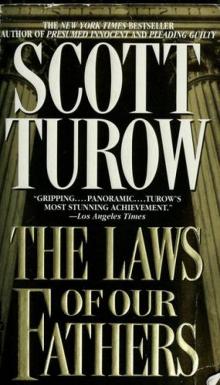 The Laws of Our Fathers
The Laws of Our Fathers Ordinary Heroes
Ordinary Heroes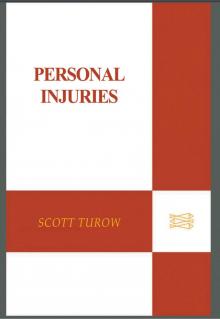 Personal Injuries
Personal Injuries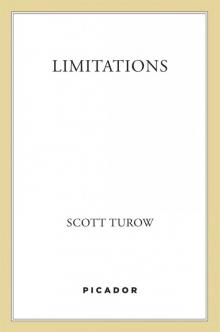 Limitations
Limitations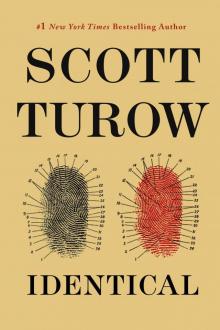 Identical
Identical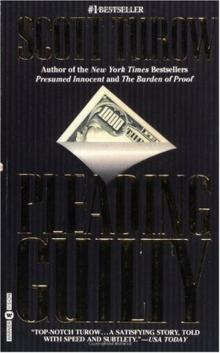 Pleading Guilty
Pleading Guilty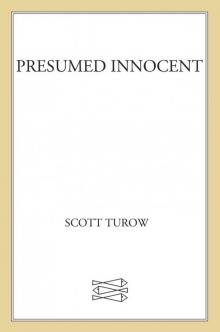 Presumed Innocent
Presumed Innocent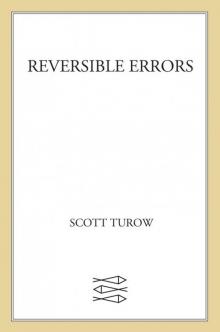 Reversible Errors
Reversible Errors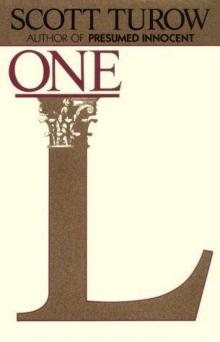 One L: The Turbulent True Story of a First Year at Harvard Law School
One L: The Turbulent True Story of a First Year at Harvard Law School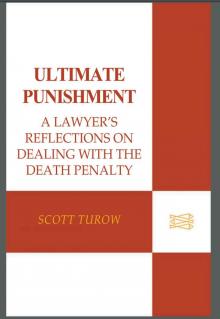 Ultimate Punishment
Ultimate Punishment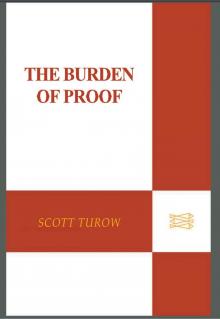 The Burden of Proof
The Burden of Proof Ordinary Heroes (2005)
Ordinary Heroes (2005)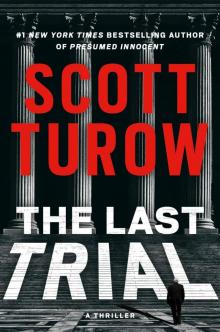 The Last Trial
The Last Trial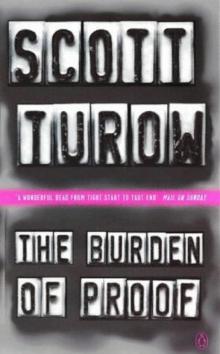 The Burden of Proof kc-2
The Burden of Proof kc-2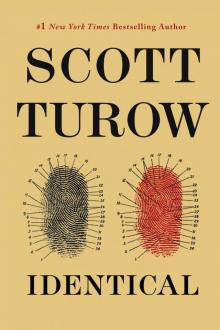 KC09 - Identical
KC09 - Identical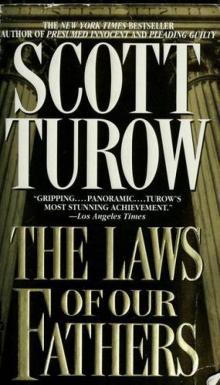 The Laws of our Fathers kc-4
The Laws of our Fathers kc-4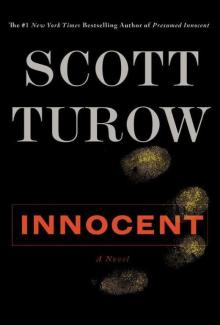 Innocent kc-8
Innocent kc-8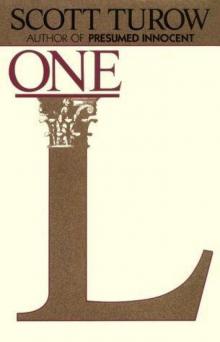 One L
One L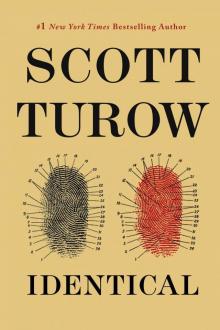 Identical kc-9
Identical kc-9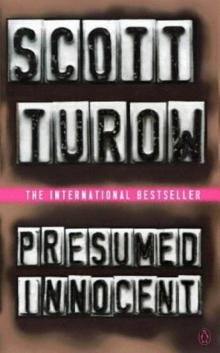 Presumed innocent kc-1
Presumed innocent kc-1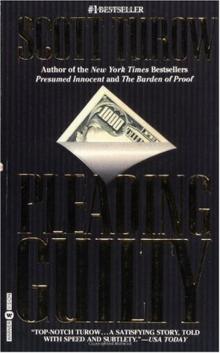 Pleading Guilty kc-3
Pleading Guilty kc-3 One L (1977)
One L (1977)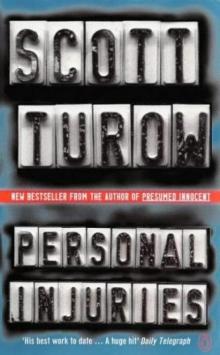 Personal injuries kc-5
Personal injuries kc-5